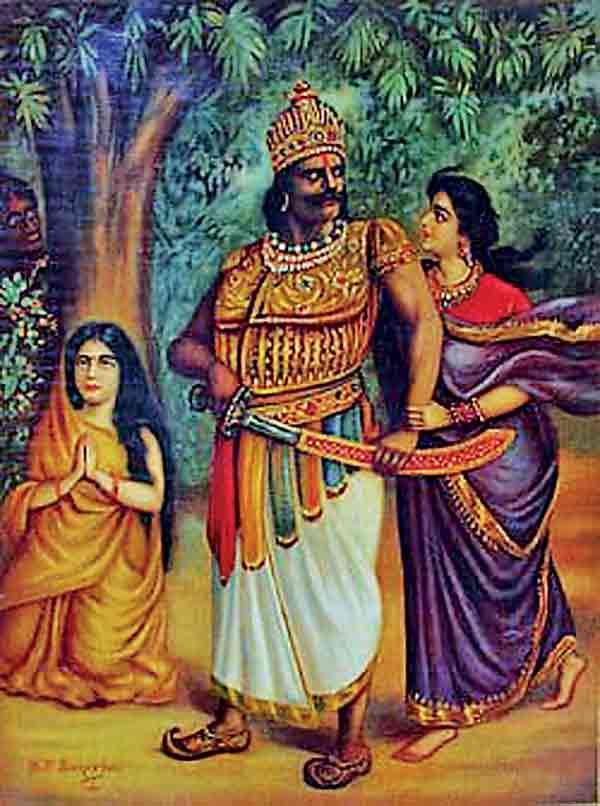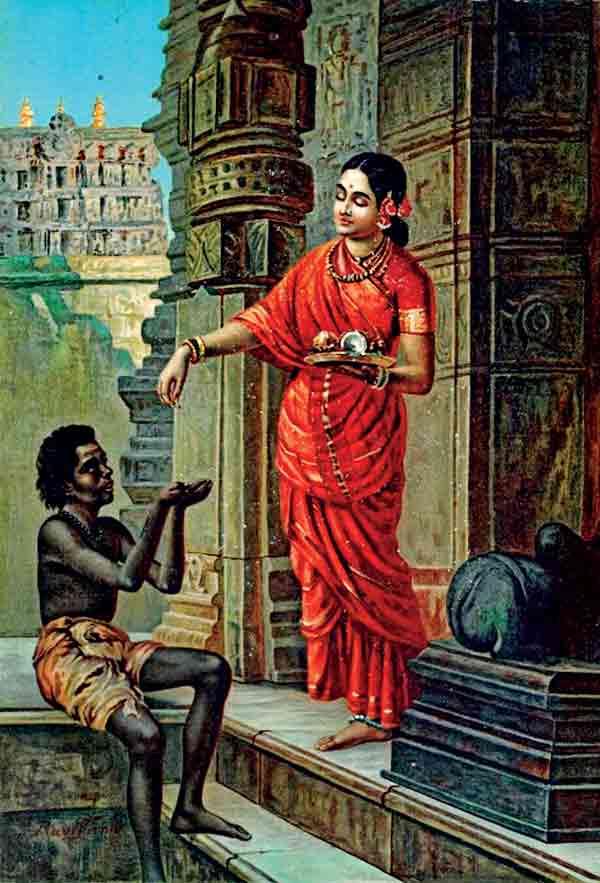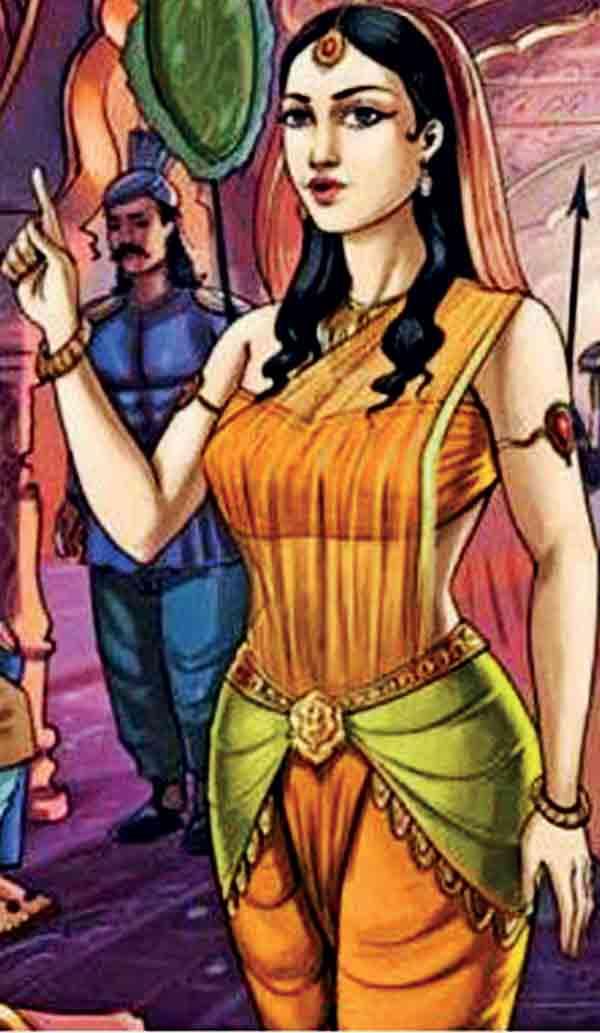
In the epic narrative of Ramayana, Mandodari is hardly the innermost queen only of Ravana, but a highly profound and significant figure in her own right. Her contribution to the story is very limited but it holds a lot of significance in understanding the emotional and moral challenges that lie unacknowledged in this very old tale. Mandodari’s lineage represented a crossing of the heavenly and the evil as the daughter of Mayasura, the king of the demons, and Hema, the celestial nymph a metaphor of equilibration between the need of a warrior and the skills of a dancer, power and compassion.
The wisdom of Mandodari is shown by her capability to maintain her serenity and self-control during the most difficult situations. She was very frequently Ravana’s representative of reason, fearlessly giving him arguments to reverse his decisions especially his theft of Sita, which was the main reason of his defeat. Although her status was highest as queen, she did not let the position affect her thinking. No matter how loyal she was to Ravana, she would never lose her mind because of it. On the contrary, she was always attempting to lead him back on the road of dharma righteousness, knowing that his ego and pride were the main reasons for his mistakes.
A Life of Contrasts
Mandodari’s life, as portrayed in the Ramayana and various regional retellings, is a compelling tapestry woven with contrasts divinity and mortality, loyalty and dissent, power and restraint. Her birth itself is wrapped in celestial and demonic symbolism. As the daughter of Mayasura, the king of the Asuras demons, and Hema, an apsara, celestial nymph, she is born from a union that straddles two contrasting realms, the terrestrial and the divine. This unique heritage grants her both grace and strength, beauty and wisdom qualities that make her not only a queen but a figure of quiet authority and introspection.
Her marriage to Ravana is equally symbolic. Ravana, a learned scholar, powerful ruler, and devotee of Lord Shiva, is also the embodiment of unchecked ambition and ego. Their union, conducted through Vedic rites, is more than just a royal alliance; it is a confluence of opposing energies. While Ravana often represents chaos and moral ambiguity, Mandodari embodies balance, order, and moral clarity. This contrast is not merely metaphorical; it plays out throughout the epic in the way Mandodari responds to her husband’s actions.
Despite being married to a man who is infamous for abducting Sita and waging war against Rama, Mandodari’s loyalty never falters. However, hers is not a passive loyalty. Time and again, she counsels Ravana to release Sita and avoid the path of destruction. Her role as a moral compass is evident when she challenges his decisions not publicly or rebelliously, but with measured wisdom and deep concern. She does not seek to embarrass or challenge his authority, but instead appeals to his better judgment, reminding him of the values of dharma righteousness, self-restraint, and foresight.
The contrast between Mandodari and Ravana is sharp yet respectful. While Ravana is driven by desire, pride, and conquest, Mandodari is grounded in emotional intelligence and ethical reasoning. She does not command armies or sit in war councils, but her words hold weight. She is not just a queen by title but a moral anchor in a palace often dominated by pride and aggression.

A Voice of Reason
Throughout the Ramayana, Mandodari is portrayed as a paragon of virtue and wisdom, consistently counseling Ravana against his hubris and urging him to return Sita to Rama. Her pleas, though often met with obstinance, underscore her moral clarity and strength of character. Mandodari’s unwavering commitment to righteousness, even in the face of personal loss, serves as a testament to her character.
Compassion and Intervention
One of the most poignant episodes highlighting Mandodari’s compassion is her intervention during Ravana’s confrontation with Sita. When Ravana threatens Sita’s life, Mandodari intervenes, preventing a grievous sin. This act not only saves Sita but also reinforces Mandodari’s role as a guardian of dharma.
Legacy and Resilience
Following Ravana’s demise, Mandodari’s resilience and commitment to her kingdom are evident. In certain versions of the Ramayana, she marries Vibhishana, Ravana’s brother, to ensure political stability in Lanka. This union, often interpreted as a strategic alliance, underscores her dedication to the welfare of her people over personal grief. Mandodari’s legacy is further cemented by her inclusion among the Panchakanya, a group of five revered women in Hindu tradition.
Throughout the Ramayana, Mandodari is portrayed as a paragon of virtue and wisdom, consistently counseling Ravana against his hubris and urging him to return Sita to Rama
A Testament to Feminine Strength
Mandodari’s narrative, though often relegated to the periphery of the Ramayana, offers profound insights into the complexities of duty, morality, and feminine strength. Her unwavering commitment to dharma, even amidst personal turmoil, serves as a testament to her character. In revisiting her story, we are reminded of the silent pillars of strength that uphold the moral fabric of epic tales, urging us to recognize and honor their contributions.
The Significance of Mandodari’s Story
Mandodari’s story in the Ramayana stands as a profound illustration of morality, feminine strength, and strategic wisdom. Her unwavering commitment to dharma righteousness, even when surrounded by chaos and destruction, highlights her deep moral conviction. Despite being the queen of a kingdom led by a husband whose choices often strayed from ethical paths, she remained grounded in principle, consistently urging Ravana to choose the path of righteousness. Her strength, however, wasn’t just in her moral stance. Mandodari’s quiet resilience and emotional fortitude reflect the often-unseen power of women in shaping the moral foundation of families and societies. She was neither a warrior nor a ruler by title, but her presence and influence were undeniably central to the narrative.
Perhaps most notably, her decision to marry Vibhishana after Ravana’s death wasn’t driven by personal desire but by a larger vision ensuring political continuity and stability in Lanka. This act, rooted in duty and foresight, reveals Mandodari’s strategic acumen and her selfless dedication to the well-being of her people. Through her, we see that leadership isn’t always loud it is often defined by quiet strength, wisdom, and sacrifice.
Mandodari’s story is a testament to the power of morality, duty, and feminine strength. Her legacy continues to inspire and educate, offering valuable insights into the complexities of human relationships and the importance of upholding righteousness.












